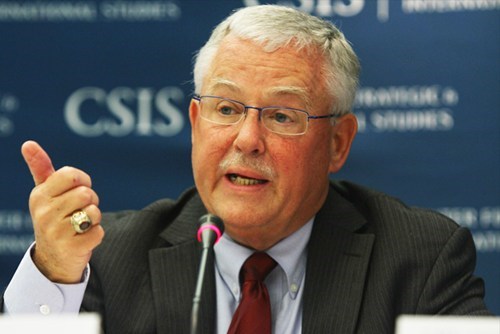Carlyle Thayer: ASEAN should be more proactive in asserting unity and centrality
VGP - ASEAN and Viet Nam should be more proactive in asserting ASEAN unity and centrality at a time of heightened tensions among the major power, emphasized professor Carlyle Thayer from the University of New South Wales and the Australian Defense Force Academy.

Professor Carlyle Thayer from the University of New South Wales and the Australian Defense Force Academy
Carlyle Thayer stressed the above point during an interview with the Viet Nam Government Portal ahead of the 40th and 41st ASEAN Summits and related Summits in Cambodia.
Major achievements
Carlyle Thayer said ASEAN has accomplished five major achievements since it was founded in 1967.
First, ASEAN internalized four norms known collectively as the ASEAN Way – dialogue and consultation, consensus, non-interference and moving at a pace comfortable to all. And members renounced force by adopting the Treaty of Amity and Cooperation.
Second, ASEAN expanded beyond its first five founding members to include Brunei, Viet Nam, Laos, Myanmar and Cambodia and is likely to add Timor-Leste.
Third, ASEAN has become highly institutionalized with regular ministerial meetings and leaders' summit. ASEAN established a permanent Secretariat in Indonesia and adopted a Charter to formalize relations among its members.
Fourth, ASEAN promoted regional integration through the ASEAN Free Trade Agreement and expanded this to Community Building based on three pillars – Political Security, Economic, Socio-Cultural.
Fifth, ASEAN formalized relations with other states through dialogue and sectoral partnerships and my establishing ASEAN-led multilateral institutions: ASEAN Regional Forum (ARF), East Asia Summit (EAS), ASEAN Defense Ministers' Meeting Plus (ADMM Plus), Expanded ASEAN Maritime Forum, and the Asia-Europe Meeting.
Regarding Viet Nam's role, Carl Thayer said Viet Nam has been a leader in ASEAN with initiatives to lower the development gap between less developed members and more developed members. A Vietnamese senior official, Le Luong Minh, successfully served as ASEAN Secretary General. And, as ASEAN Chair, Viet Nam proactively led a region-wide effort to combat the COVID-19 pandemic.
Significance of upcoming ASEAN Summits amid global headwinds
ASEAN's international importance rests on its convening power to hold annual meetings of a network of ASEAN-related multilateral institutions, such as ASEAN Plus 1, ARF, EAS, ADMM Plus, which the major powers attend, according to Carlyle Thayer.
ASEAN Summits provide the opportunity for ASEAN Plus 1 meetings with government leaders to deal specifically with bilateral matters. The EAS is the only leaders-led institution in the Indo-Pacific and it serves as a strategic dialogue forum on political, economic and security issues. ASEAN by itself cannot solve global problems on its own but it can promote dialogue and consultation among its dialogue partners.
ASEAN functions by consensus decision-making and therefore its Chairman's statements are often general. The Five Point Consensus to deal with the situation in Myanmar and the ASEAN Outlook on the Indo-Pacific, adopted by ASEAN Member States, are among clear examples.
Carlyle Thayer expressed his belief that ASEAN will not take sides in major power competition and expects major powers to support ASEAN unity and centrality in the region's security architecture.
ASEAN performs much better in dealing with economic issues through free trade agreements with China, Australia-New Zealand, Japan, India, South Korea and Hong Kong as well as the Regional Comprehensive Economic Partnership.
Core principles adhered to regardless global situation
Carlyle Thayer said that ASEAN should follow the core principles and norms in (i) the Five Principles of Peaceful Coexistence (mutual respect for sovereignty and territorial integrity, mutual non-aggression, non-interference in each other's internal affairs, equality and mutual benefit, and peaceful coexistence), (ii) the ASEAN Way (inclusivity, dialogue and consultation, consensus, non-interference, and moving at a pace comfortable to all), and (iii) the Treaty of Amity and Cooperation (peaceful settlement of disputes, renunciation of the threat or use of force and promotion of the rule of law).
How to maintain ASEAN's central organizing role
Carlyle Thayer expressed his belief that ASEAN and Viet Nam should be more proactive in asserting ASEAN unity and centrality at a time of heightened tensions among the major power.
Specifically, this means not being passive and reactive to developments, but proactive in promoting initiatives to resolve outstanding problems, he explained.
Possible outcomes from ASEAN Summits
Regarding the possible outcomes from the upcoming ASEAN Summits and related Summits, Carlyle Thayer said ASEAN summits are predictable because the final agenda is invariably the result of intensive work at lower levels, senior levels and ministerial levels. There are two major baskets of issues the 40th and 341st ASEAN Summits will consider: ASEAN Community Building and of ASEAN External Relations.
The ASEAN Summits will take note of and approve recommendations on the ASEAN Community Post-2025 Vision, Review of the implementation of the ASEAN Charter, ASEAN's response to COVID-19, ASEAN connectivity, Initiative for ASEAN Integration, sub-regional cooperation, and the ASEAN junior fellowship program within the ASEAN Secretariat.
The ASEAN Summits will discuss the following issues in ASEAN's external relations: Timor-Leste's application for membership, ASEAN centrality and relations with dialogue partners, the situation in Myanmar, Russia-Ukraine situation, East Sea, and denuclearization of the Korean peninsula.
The situation in Myanmar will be a key issue. Indonesia, the ASEAN Chair for 2023, is reportedly drafting a road map to implement the Five Point Consensus and ASEAN leaders will endorse this initiative./.

